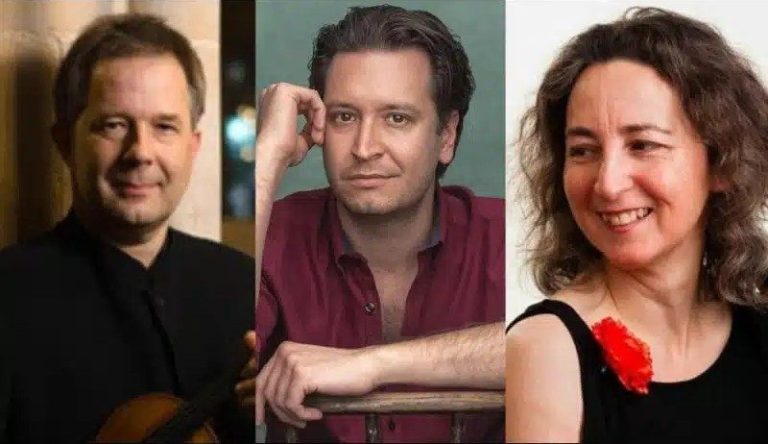The Duke Trio - June 27th, 2025
The Programme
David Malusa, Peter Davis and Lorraine Deacon
Perform piano works from:
- Haydn – Trio in G (The Gypsy)
- Rachmaninov – Trio Elégaique
- Beethoven – Trio in B flat, Op.97 (The Archduke)
Concert Programme
A programme of song exploring our profound, joyful, and sometimes adversarial
relationship to the natural world
Franz Joseph Haydn (1732-1809)
Trio in G major, Hob.XV:25
- Andante
- Poco Adagio
- Rondo all’Ongarese: Presto
Sergei Vasilyevich Rachmaninov (1873-1943)
Trio élégiaque No.1 in G. minor.
Interval -20 minutes
Ludwig van Beethoven (1770-1827)
Trio in Bb major, Op.97 – The Archduke
- Allegro moderato
- Scherzo – Allegro
- Andante cantabile, ma però con moto
- Allegro moderato – Presto
A simple definition of chamber music is music written for small ensemble either for private (domestic) performance or, if in the presence of an audience, for a relatively small hall. Thus says the Oxford Companion to Music. So this evening’s music in our Recital Room, is most definitely Chamber Music and with examples of the very best of the genre. Way back in the day, domestic music was aimed at the enthusiastic amateur. As time went on and instrument design developed, the Viol (with frets) became the violin and the keyboard instrument of choice moved from the harpsichord to the piano, the whole genre became more sophisticated in tone and technical difficulty. However, at one’s peril, we should not forget the gems of small ensemble works of the Baroque period with music by such composers as Purcell, Bach, Telemann, Corelli and Handel, beside the French masters Couperin and Rameau.
Our programme this evening begins with Haydn. He, along with his younger contemporary, Wolfgang Mozart, wrote chamber music that included a keyboard instrument that began with the harpsichord, but gradually incorporated the new piano. Haydn, that most prolific of composers, wrote an enormous amount of chamber music alongside his 104 symphonies. He knew his market well and wrote quartets and trios in abundance – the composer’s ingenuity seems endless. As a performer in the string quartet, the viola player was sometimes the young Mozart – what a thought, making music together for sheer enjoyment. The Piano Trio know as (The Gypsy) was written in 1795 during the composer’s second trip to London. It gained the nickname through the incorporation in the final Rondo of a number of Gypsy or Hungarian folk melodies. It was published in London as part of a set of 3 Trios and dedicated to his friend, the widow Rebecca Schroeter.
By the time Beethoven and later composers came to the genre, it was often the vehicle of lofty musical thoughts. This is so of both the Rachmaninov and Beethoven trios in this evening’s programme. They go beyond domestic music making and are works of great sophistication. Rachmaninov’s Trio was written between January 18 & 21, 1892 in Moscow – the composer was only 18, but it bears the hall marks and melodic style for which the composer was to become famous.
Beethoven’s Op.97 Trio was dedicated to Archduke Rudolph of Austria, an amateur pianist, and Beeethoven’s friend and patron. The composer dedicated some dozen compositions to the Archduke. The Trio was composed between 1810 and 1811. It was written at a time when Beethoven was experiencing considerable success as a composer but was concerned about his increasing deafness. In the first private and public performances, the composer’s ability to play in ensemble was compromised. Louis Spohr, the famous composer and violinist, attended a rehearsal of the work and wrote: “on account of his deafness there was scarcely anything left of the virtuosity of the artist which had formerly been so greatly admired. In forte passages the poor deaf man pounded on the keys until the strings jangled, and in piano he played so softly that whole groups of notes were omitted, so that the music was unintelligible unless one could look into the pianoforte part. I was deeply saddened at so hard a fate."
Programme Notes Copywrite Alistair Jones, 2025

The Duke Trio
With the advent of a new chamber music competition for the students at Wellington College, David Malusa, Peter Davis and Lorraine Deacon took the opportunity to lead by example and formed the The Duke Piano Trio. Their programme includes works by the greats: Haydn, Rachmaninov and Beethoven.
